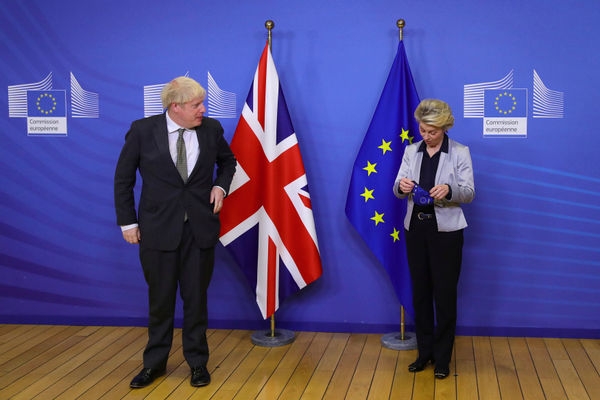The EU has reversed its decision to trigger Article 16 of the post-Brexit Northern Ireland Protocol to monitor and in some cases block exports of vaccines produced in EU plants.
The move could have seen checks at the border of Ireland and Northern Ireland to prevent shipments entering the UK.
Following criticism from British PM Boris Johnson, Northern Ireland First Minister Arlene Foster among others, Brussels decided to backtrack their decision.
The plans had been part of the EU’s new export controls on vaccines, to combat delivery shortfalls.
The Brexit deal’s Northern Ireland protocol allows goods to flow between EU member Ireland and Northern Ireland, which is part of the United Kingdom, without the need for customs checks at the border.
Under the protocol’s Article 16, either party can unilaterally suspend the terms for specific goods if the agreement leads “to serious economic, societal or environmental difficulties that are liable to persist”.
ALSO READ | WHO warns of ‘vaccine nationalism’ as EU launches COVID-19 vaccine export control scheme
On Friday evening the EU announced it would trigger the clause and introduce the export controls on its vaccines entering Northern Ireland in a bid to prevent the region becoming a backdoor for jabs to be sent to the UK mainland.
It said the actions were “justified” to avert problems caused by a lack of supply.
But the proposals sparked concern from Irish Prime Minister Micheál Martin as well as all five parties in Northern Ireland’s devolved government.
Northern Ireland First Minister Arlene Foster described it as “an absolutely incredible act of hostility” that created a hard Irish border, while Ireland’s Foreign Minister Simon Coveney said in a tweet: “The [Northern Ireland] Protocol is not something to be tampered with lightly, it’s an essential, hard-won compromise, protecting peace and trade for many.”
Retracting the decision after the backlash, the EU Commissioner said in a statement late Friday, “The Commission will ensure that the Ireland / Northern Ireland Protocol is unaffected.”
British Prime Minister Boris Johnson had told EU chief Ursula von der Leyen of his “grave concerns about the potential impact” the European bloc’s decision might have.
The European scheme to monitor and bar exports of vaccines produced in EU plants has also been criticised by the World Health Organization.
The WHO said the move was part of a “very worrying trend” that could jeopardise the global supply chain for vaccines.
Although the EU has rowed back from the Article 16 threat, a Commission statement said if there were vaccines circumventing the European system, “the EU will consider using all the instruments at its disposal”.
The EU earlier justified the “safeguard measure” as an attempt to keep member states’ vaccine rollouts on track.
And Health Commissioner Stella Kyriakides insisted: “We are not protecting ourselves against any specific country. And we’re not in competition or in a race against any country.”
ALSO READ | Britain, EU trade suffers nearly one month after post-Brexit deal
Brussels had said it would invoke the article to monitor and in some cases block exports of vaccines produced in EU plants.
The move brought both sides of Northern Ireland’s Loyalist and Republican divide together in condemnation.
Colum Eastwood, leader of the republican SDLP party, said the move was a “disproportionate and grave error” by the EU.
There is little or no physical infrastructure on the border thanks to the 1998 Good Friday Agreement.
That deal ended decades of violence between those who want Northern Ireland to remain British and those who want it to be part of the Irish republic.
Maintaining a “soft” border was integral to Brexit negotiations, with local leaders warning of a potential return to violence.







